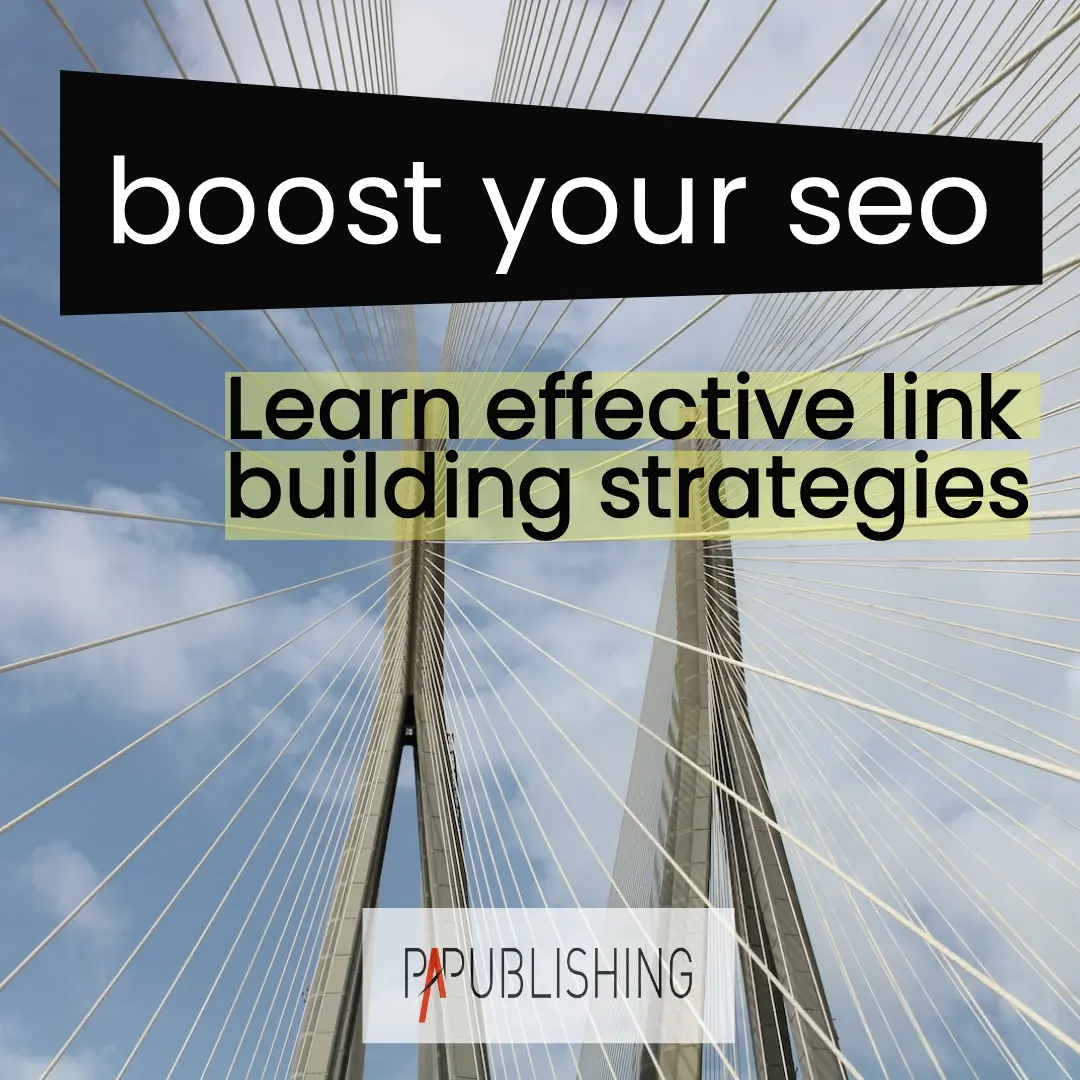Link building is a crucial aspect of search engine optimization (SEO) that can greatly impact the visibility and ranking of a website in search engine results pages (SERPs). In simple terms, link building involves acquiring hyperlinks from other websites to your own. These links act as votes of confidence for your website, signaling to search engines that your content is valuable and trustworthy. As a result, search engines are more likely to rank your website higher in SERPs, leading to increased organic traffic and potential customers.
Understanding the Importance of Link Building for SEO
Links play a significant role in determining the authority and relevance of a website in the eyes of search engines. When search engines crawl the web, they analyze the number and quality of links pointing to a particular website. The more high-quality links a website has, the more likely it is to be considered authoritative and relevant by search engines. This, in turn, can lead to higher rankings in SERPs.
In addition to the quantity of links, the diversity and relevance of links also play a crucial role in SEO. Search engines value links from a variety of sources, as it indicates that your website is popular and respected across different platforms. Furthermore, links from websites that are topically relevant to your own are considered more valuable than links from unrelated websites. Therefore, it is important to focus on building a diverse and relevant link profile to improve your SEO efforts.

The Different Types of Links and Their Impact on SEO
There are several types of links that can impact SEO in different ways. Internal links are links that point from one page on your website to another page on the same website. These links help search engines understand the structure and hierarchy of your website, as well as navigate through your content. Internal links also help distribute link equity throughout your website, improving the visibility of all pages.
External links, on the other hand, are links that point from your website to another website. These links can be valuable for SEO if they are from reputable and authoritative websites. When you link to high-quality external sources, it signals to search engines that your content is well-researched and trustworthy. However, it is important to be cautious with external links, as linking to low-quality or spammy websites can have a negative impact on your SEO efforts.
Another important distinction in link building is between dofollow and nofollow links. Dofollow links are links that pass link equity from one website to another, helping to improve the ranking of the linked-to website. Nofollow links, on the other hand, do not pass any link equity and are used to indicate to search engines that the linked-to website should not be associated with the linking website. While nofollow links do not directly impact SEO, they can still be valuable for driving traffic and increasing brand visibility.
How to Identify High-Quality Websites for Link Building
When it comes to link building, it is crucial to focus on acquiring links from high-quality websites. High-quality websites are those that have a strong online presence, are trusted by search engines, and have a good reputation within their industry. Acquiring links from these websites can significantly boost your own website’s authority and visibility in SERPs.
There are several criteria you can use to identify high-quality websites for link building. Firstly, consider the website’s domain authority (DA) and page authority (PA). These metrics, developed by Moz, provide an indication of how well a website is likely to rank in search engine results. Websites with higher DA and PA scores are generally considered more authoritative and trustworthy.
Additionally, consider the relevance of the website to your own industry or niche. Links from websites that are topically relevant to your own are considered more valuable by search engines. For example, if you run a fitness blog, acquiring links from other fitness-related websites would be more beneficial than links from unrelated websites.
There are also several tools available that can help you find potential link building opportunities. Tools like Moz’s Link Explorer, Ahrefs, and SEMrush can provide insights into a website’s backlink profile, allowing you to identify high-quality websites that are linking to your competitors. These tools can also help you analyze the authority and relevance of potential link sources, making it easier to prioritize your link building efforts.
Creating Link-Worthy Content to Attract Backlinks
One of the most effective ways to attract backlinks is by creating valuable and shareable content. When you create content that provides value to your target audience, other websites are more likely to link to it as a resource. This not only improves your website’s visibility and authority but also drives organic traffic from the websites linking to you.
To create link-worthy content, it is important to understand your target audience and their needs. Conduct thorough research on the topics that are relevant to your industry and identify gaps or areas where you can provide unique insights or perspectives. By creating content that fills these gaps or provides valuable information, you increase the likelihood of other websites linking to it.
Additionally, make sure your content is well-structured and easy to read. Use headings, subheadings, bullet points, and images to break up the text and make it more visually appealing. This not only improves the user experience but also makes it easier for other websites to reference and link to specific sections of your content.
The Art of Guest Blogging for Link Building

Guest blogging is another effective strategy for acquiring high-quality backlinks. Guest blogging involves writing and publishing articles on other websites within your industry or niche. By contributing valuable content to these websites, you can establish yourself as an authority in your field and acquire links back to your own website.
When looking for guest blogging opportunities, focus on websites that have a strong online presence and a good reputation within your industry. Look for websites that have a large and engaged audience, as this will increase the visibility and reach of your guest posts. Additionally, consider the website’s domain authority and relevance to your own website.
When creating guest posts, make sure to provide valuable and unique content that is relevant to the website’s audience. Avoid self-promotion and focus on providing insights, tips, or solutions to the readers. This will increase the likelihood of your guest post being accepted and shared by the website’s audience, as well as attract backlinks from other websites.
Building Relationships with Influencers for Link Building
Building relationships with influencers in your industry can be a powerful way to acquire high-quality backlinks. Influencers are individuals or organizations that have a large and engaged following on social media or within their industry. By establishing relationships with these influencers, you can leverage their authority and reach to acquire backlinks and increase the visibility of your website.
To build relationships with influencers, start by identifying key individuals or organizations within your industry. Follow them on social media, engage with their content, and share their posts. This will help you establish yourself as a valuable member of their community and increase the likelihood of them noticing and engaging with your content.
Once you have established a relationship with an influencer, reach out to them with a personalized message explaining how you admire their work and would love to collaborate or contribute to their website. Offer to provide valuable content or insights that would be relevant to their audience. By providing value upfront, you increase the likelihood of them accepting your offer and linking back to your website.
Utilizing Social Media for Link Building
Social media can be a powerful tool for link building, as it allows you to reach a large audience and engage with potential link sources. By sharing valuable content on social media platforms, you can attract backlinks from other websites and increase the visibility of your website in SERPs.
To effectively use social media for link building, start by identifying key influencers and websites within your industry. Follow them on social media, engage with their content, and share their posts. This will help you establish relationships with these individuals and increase the likelihood of them noticing and engaging with your content.
Additionally, make sure to share your own content on social media platforms. Create compelling and shareable posts that provide value to your audience. Encourage your followers to share your content and provide a link back to your website. This not only increases the visibility of your content but also attracts backlinks from other websites.
The Dos and Don’ts of Link Building
When it comes to link building, there are several best practices that you should follow to ensure ethical and effective strategies. Firstly, focus on acquiring links from high-quality and relevant websites. Avoid acquiring links from low-quality or spammy websites, as this can have a negative impact on your SEO efforts.
Additionally, make sure to diversify your link profile by acquiring links from a variety of sources. This includes acquiring links from different types of websites (e.g., blogs, news sites, industry directories) as well as different types of content (e.g., articles, infographics, videos). This diversity signals to search engines that your website is popular and respected across different platforms.
Furthermore, avoid engaging in black hat SEO techniques such as buying or exchanging links. These practices are against search engine guidelines and can result in penalties or even deindexing of your website. Instead, focus on creating valuable content and building genuine relationships with influencers and other websites within your industry.
Measuring the Success of Your Link Building Strategy
To measure the success of your link building efforts, it is important to track and analyze relevant metrics. One key metric to track is the number of backlinks acquired over time. This can be done using tools like Moz’s Link Explorer, Ahrefs, or SEMrush. By monitoring the number of backlinks, you can assess the effectiveness of your link building strategies and identify areas for improvement.
Another important metric to track is the organic traffic to your website. By analyzing the organic traffic over time, you can determine whether your link building efforts are driving more visitors to your website. Additionally, you can use tools like Google Analytics to track the conversion rate and engagement metrics of the visitors acquired through backlinks.
Lastly, it is important to track the rankings of your target keywords in SERPs. By monitoring the rankings over time, you can assess whether your link building efforts are improving your website’s visibility and authority in search engine results. Tools like Moz’s Rank Tracker or SEMrush can help you track keyword rankings and identify areas for improvement.
Staying Up-to-Date with the Latest Link Building Trends and Techniques
Link building is a constantly evolving field, with new trends and techniques emerging regularly. To stay up-to-date with the latest link building strategies, it is important to follow industry blogs, attend conferences or webinars, and engage with other professionals in the field. By staying informed about the latest trends and techniques, you can ensure that your link building strategies remain effective and aligned with search engine guidelines.
Additionally, it is important to regularly analyze and adapt your link building strategies based on the results and feedback you receive. Monitor the performance of your backlinks, track changes in search engine algorithms, and adjust your strategies accordingly. By continuously optimizing your link building efforts, you can ensure that your website remains competitive in search engine rankings.
Link building is a crucial aspect of SEO that can greatly impact the visibility and ranking of a website in search engine results pages. By acquiring high-quality backlinks from reputable websites, you can improve your website’s authority and relevance in the eyes of search engines. This, in turn, can lead to increased organic traffic and potential customers.
To effectively implement link building strategies, it is important to understand the different types of links and their impact on SEO. Additionally, focus on creating valuable and shareable content, leveraging guest blogging opportunities, building relationships with influencers, and utilizing social media platforms. By following best practices and staying up-to-date with the latest trends and techniques, you can ensure that your link building efforts are ethical and effective.
If you’re looking to improve your website’s search engine rankings, link building is a crucial strategy to consider. Building high-quality backlinks can significantly impact your website’s visibility and authority. In a related article on PA Publishing, you can learn more about the importance of link building and how it can benefit your business.
Check out the article here to discover effective link building techniques and take your website to the next level.
Link Building Frequently Asked Questions:
Q: What does it mean to build links for SEO, and why is it important?
A: Link building is the process of getting other websites to link to your site. It’s a crucial part of SEO because these inbound links signal to search engines that your content is valuable and worthy of citation. It’s a significant ranking factor, and quality links can help improve your website’s visibility in search results.
Q: How do I start a link building campaign?
A: You begin your first link building campaign by identifying link opportunities. Research your competitors and see where they’re getting their inbound links. You should aim to get links from the same or similar places. Outreach is essential in a link building campaign. Contact website owners and ask them to link to your content. Always make sure that your content is relevant and valuable to both the site owner and their audience.
Q: Can you provide some link building tips?
A: Some link building tips include engaging in content marketing to create high-quality content that people will want to link to naturally. Be active on social media to expand your brand’s visibility and reach. You can also use various link building techniques such as broken link building and anchor text optimization. Don’t forget to diversify your link profile to encompass a mix of link types and sources.
Q: What are anchor texts and what role do they play in link building?
A: Anchor text refers to the clickable text used in a hyperlink. It’s important for SEO because search engines use it to determine what the linked page is about. It also acts as a ranking factor. However, while using your target keywords as anchor text can improve your SEO, it should be done sparingly to avoid appearing spammy.
Q: What is broken link building?
A: Broken link building is a link building technique where you find broken links on other websites and suggest your content as a replacement. A broken link provides a poor user experience, and webmasters typically appreciate the help in finding and fixing them.
Q: How does internal linking help in SEO?
A: Internal links are links that go from one page on your site to another page on the same site. They help spread link equity (ranking power) around your site, provide your audience with further reading options, and improve your site’s navigation for an overall better user experience.
Q: What’s the best way to build high-quality links?
A: The best way to build high-quality links is through earning them. This usually happens when you produce valuable, unique content that people naturally want to link to. You can also foster relationships with influencers and reputable websites in your industry who can link to your site. The focus should always be on quality, not quantity.
Q: How do I avoid bad or spammy link building?
A: The key to avoiding bad or spammy link building is to prioritize quality over quantity. Don’t fall into the trap of buying links or using automated programs to generate links. These tactics can lead to Google penalties. Instead, focus on earning links from reputable sites that are relevant to your site’s content.
Q: Can you give an example of a good link building strategy?
A: One of the favorite link building strategies is guest posting. This involves creating unique, valuable content for other websites in exchange for a link back to yours. It helps build your brand, expand your reach, and earn high-quality backlinks to your site. Remember, the more authoritative and relevant the site you guest post on, the better the link.
Q: What is link reclamation?
A: Link reclamation is the process of finding and fixing broken links pointing to your site or turning unlinked mentions of your brand into links. It’s an easy way to regain lost link value and improve your site’s standing in search engine rankings.




